Canada has expelled six Indian diplomats, including the high commissioner, over allegations that Indian agents were involved in the assassination of Hardeep Singh Nijjar, a Sikh separatist leader, on Canadian soil. The move comes as a major blow to diplomatic relations between the two countries, marking a significant escalation of tensions that have been brewing since Canadian Prime Minister Justin Trudeau first made the accusations in 2023.
In response, India expelled six high-ranking Canadian diplomats, including Canada’s acting high commissioner, and announced the withdrawal of its envoy from Canada, citing concerns over their safety. India has dismissed Trudeau’s accusations, labeling them as part of a “political agenda.”
Trudeau’s Accusations and Canada’s Stance
At a press conference, Prime Minister Trudeau revealed what he described as “clear and compelling evidence” linking Indian agents to activities that threaten public safety, including the murder of Nijjar. He accused India of engaging in covert operations to gather intelligence, coerce Indian dissidents, and commit violent acts, such as homicides and extortion, in Canada. Trudeau called these actions “unacceptable” and a fundamental violation of Canadian sovereignty.
The Royal Canadian Mounted Police (RCMP) supported these allegations, stating that India’s government has used organized crime syndicates, including the Bishnoi group, to target the South Asian Canadian community and interfere in democratic processes. Brigitte Gauvin, RCMP’s assistant commissioner, linked the Bishnoi group to Indian agents, adding to concerns about India’s role in Nijjar’s assassination.
India’s Response and Diplomatic Fallout
India has consistently denied any involvement in Nijjar’s murder and rejected Canada’s inquiry into the case. In a strongly worded statement, India’s foreign ministry expressed distrust in the Canadian government’s ability to guarantee the safety of its diplomats, leading to the withdrawal of Indian officials from Canada. Simultaneously, India ordered six Canadian diplomats to leave the country by Saturday.
Canada, for its part, had requested India to waive the diplomatic immunity of the expelled diplomats so that Canadian investigative agencies could question them regarding their suspected involvement in criminal activities. However, India refused to cooperate, leading to their expulsion.
Melanie Joly, Canada’s foreign minister, emphasized that Canada was not seeking a diplomatic confrontation but would not tolerate any country’s agents threatening or harming Canadians. She highlighted that the expulsion was only decided after the RCMP gathered substantial evidence linking the diplomats to Nijjar’s murder.
Broader Implications and International Reactions
The diplomatic row between Canada and India has escalated from what was initially a rift into a full-blown rupture in their relationship. Experts like Fen Osler Hampson, a professor of international relations at Carleton University, suggest that the breakdown of ties between the two Commonwealth nations is unlikely to be repaired in the near future.
The expulsion of Indian diplomats also comes on the heels of heightened scrutiny of India’s role in targeting Sikh separatists abroad. The U.S. has similarly alleged that Indian agents were involved in a failed assassination plot against a Sikh separatist leader in New York last year, raising further questions about India’s international activities concerning its dissidents.
The strained relations with Canada and the U.S. come at a delicate time, as both countries are seeking to strengthen their ties with India to counterbalance China’s rising influence in the region. Despite these diplomatic challenges, Canada is home to the largest Sikh population outside of Punjab, and recent protests in the country have added to the tension between Ottawa and New Delhi.
Conclusion
This diplomatic row between Canada and India represents a significant downturn in their relations, with serious allegations of state-sponsored assassinations and interference in democratic processes at the heart of the dispute. The expulsion of diplomats on both sides underscores the severity of the accusations, which could have lasting consequences for bilateral ties and international diplomacy.











